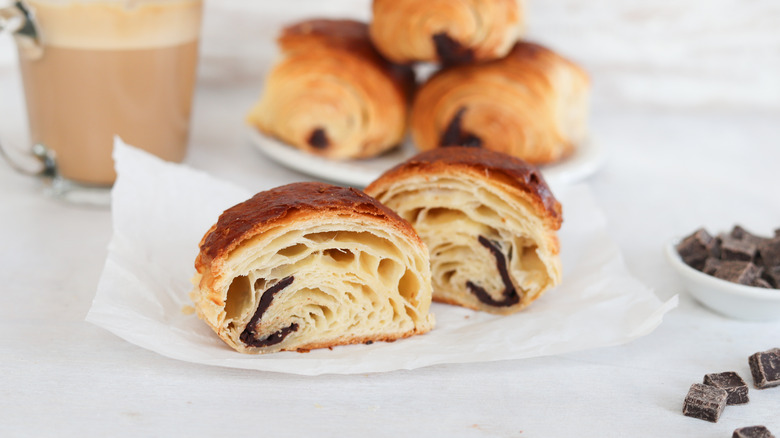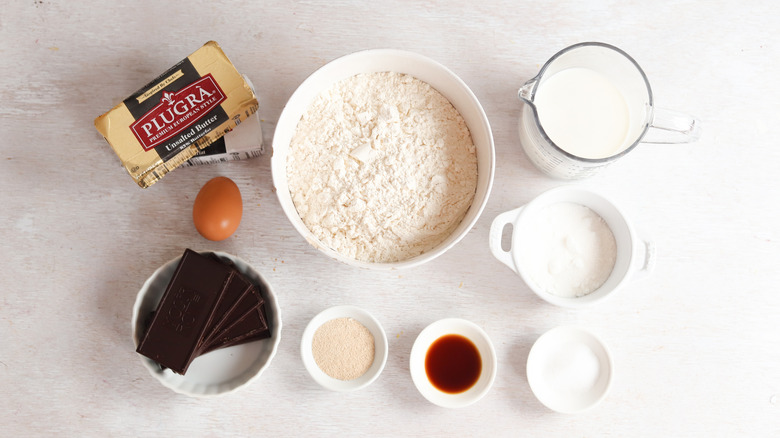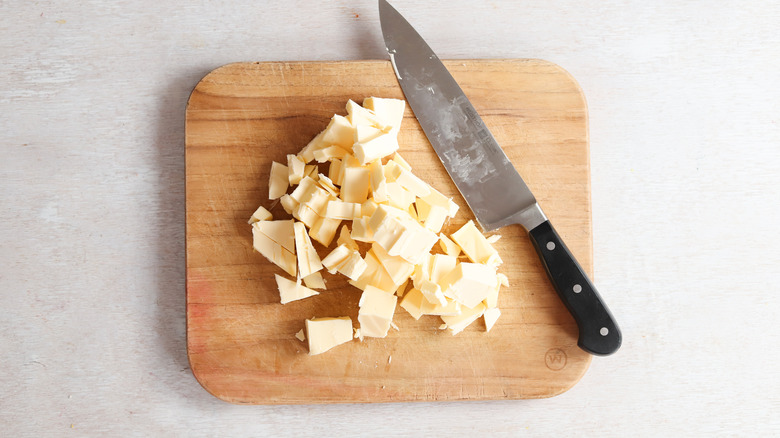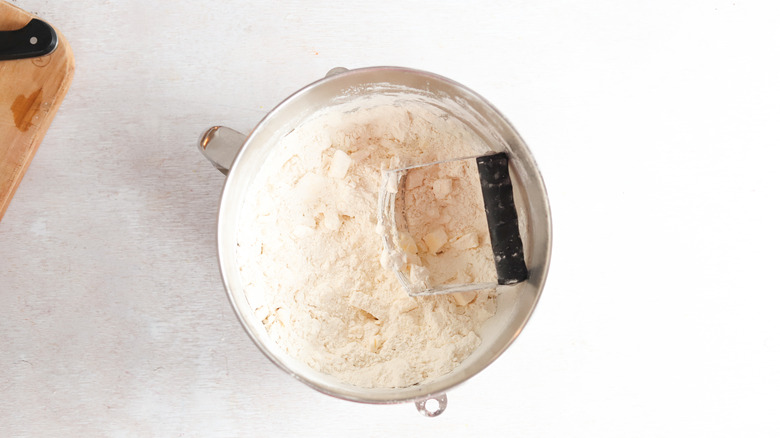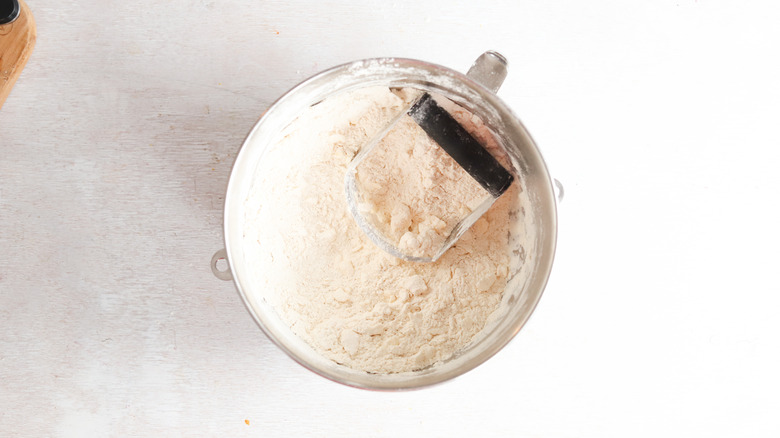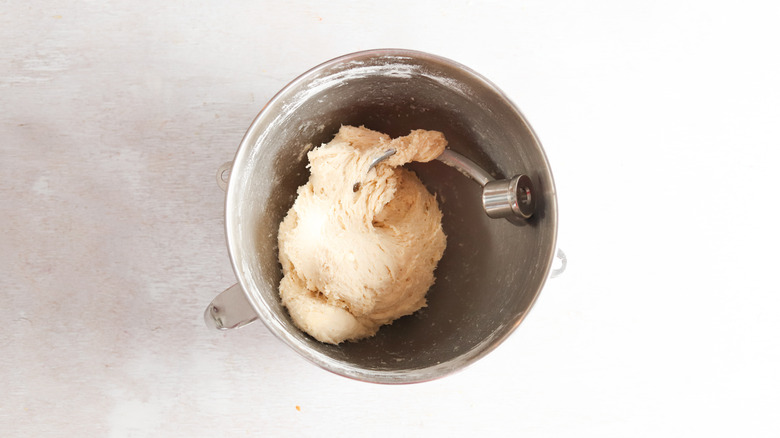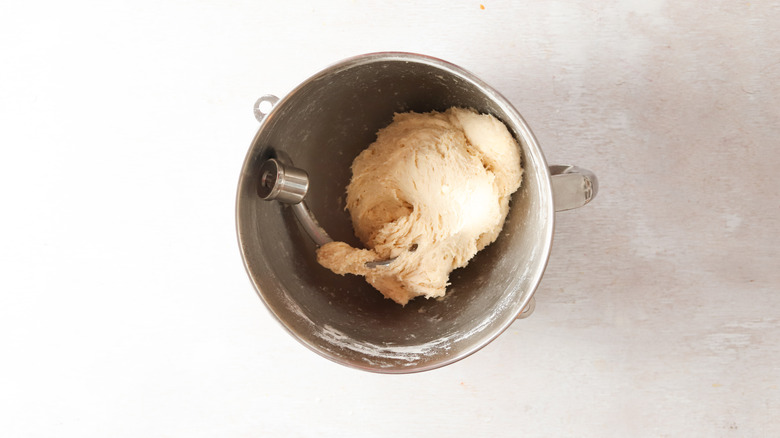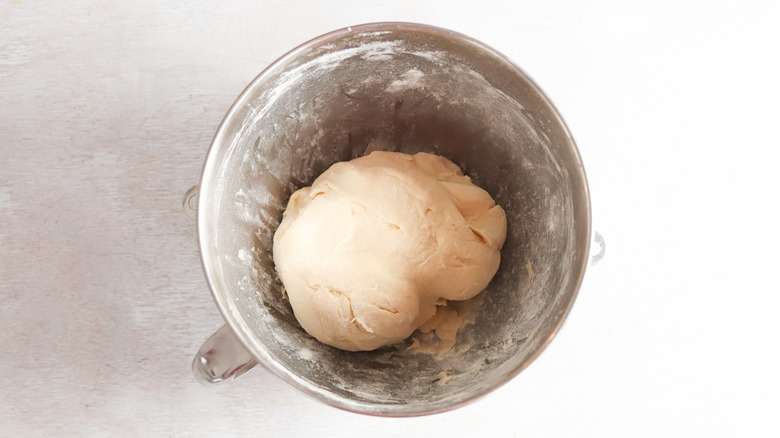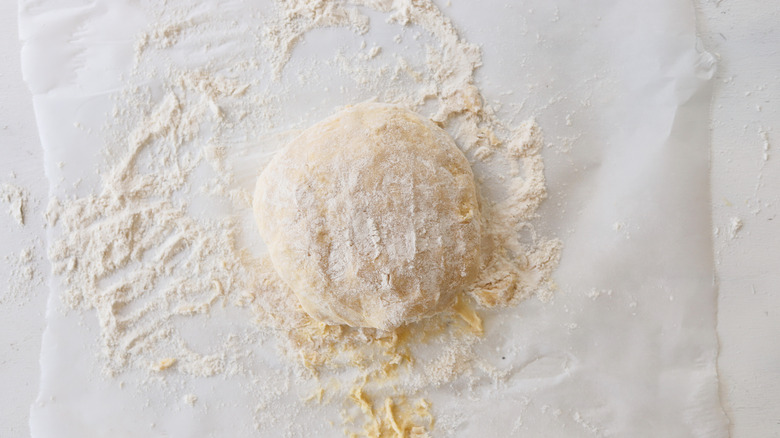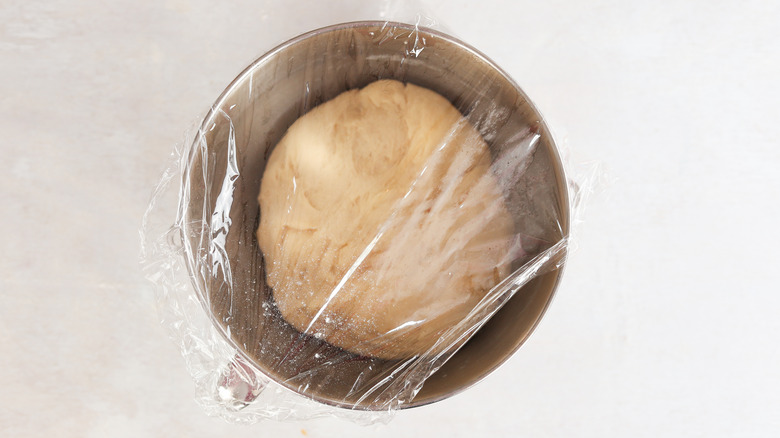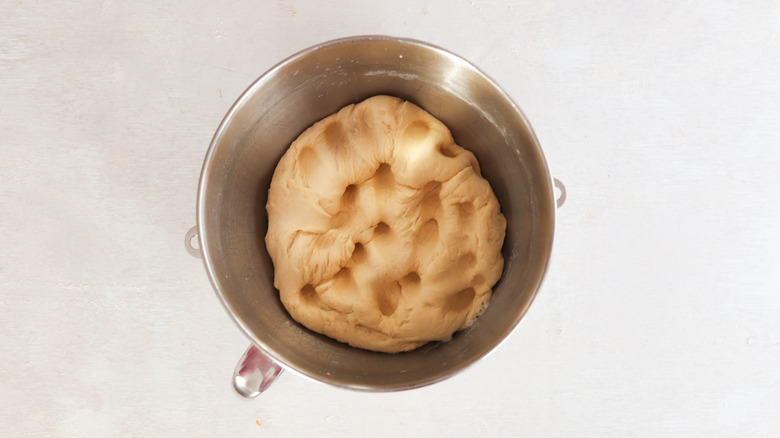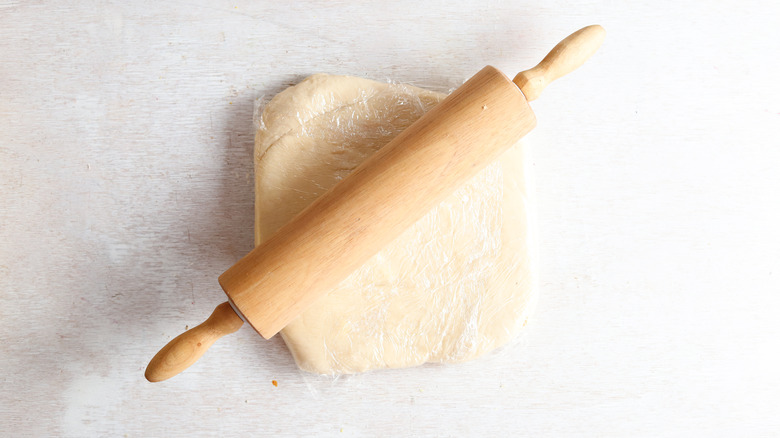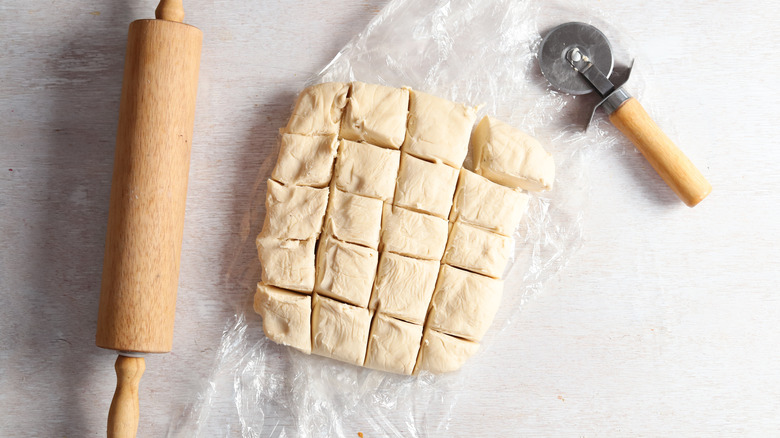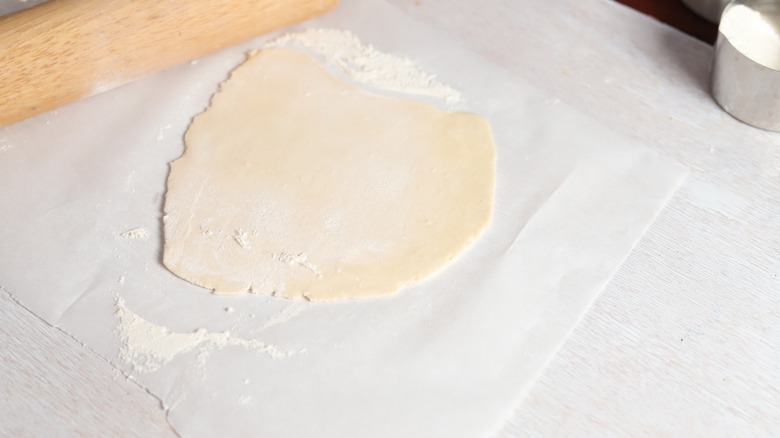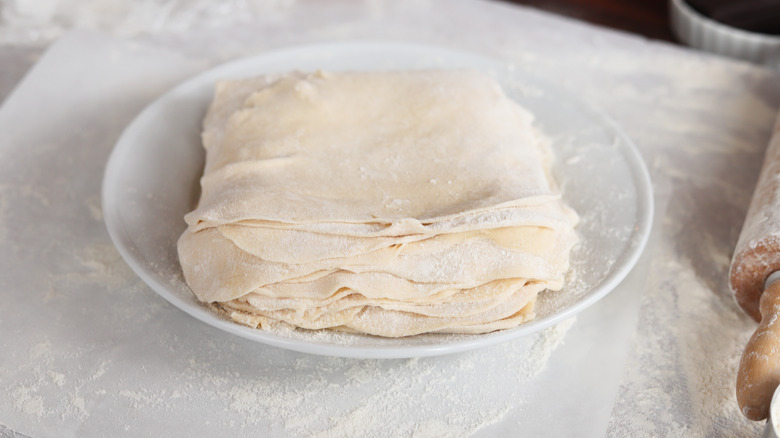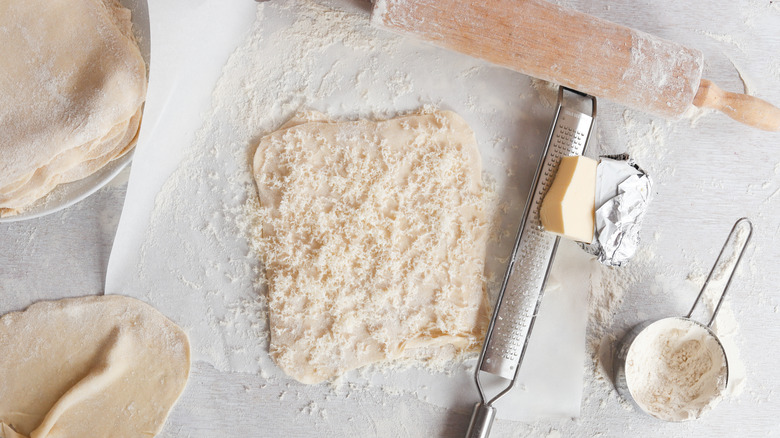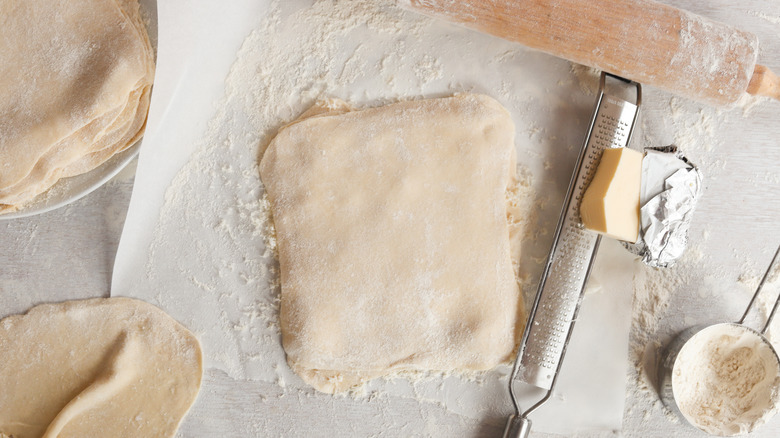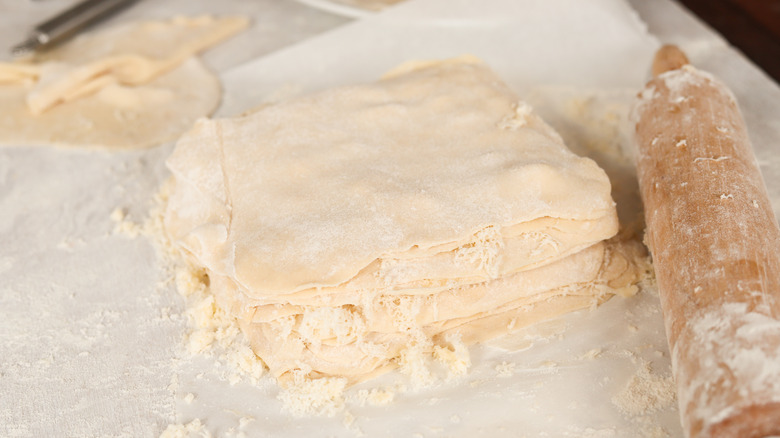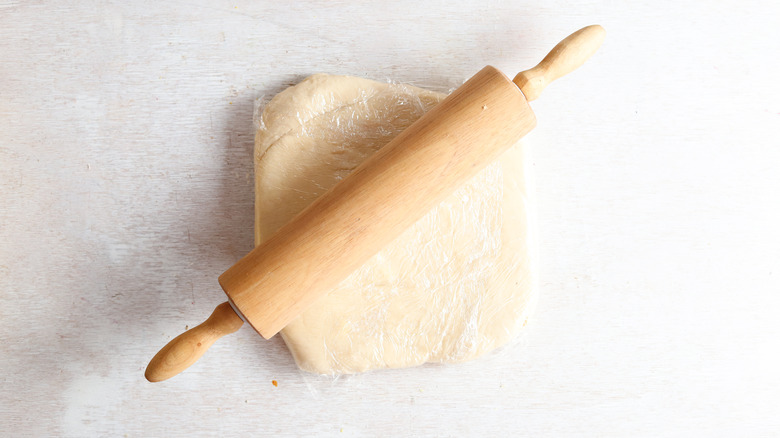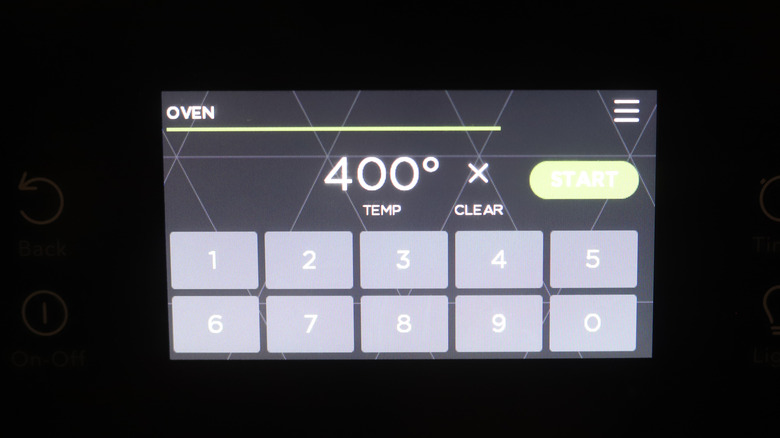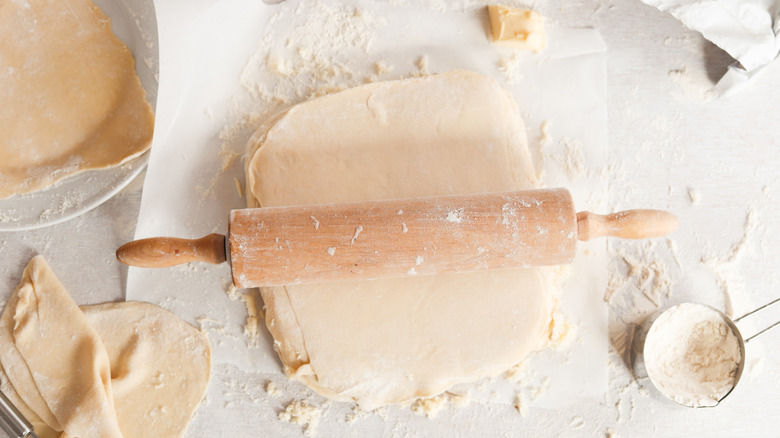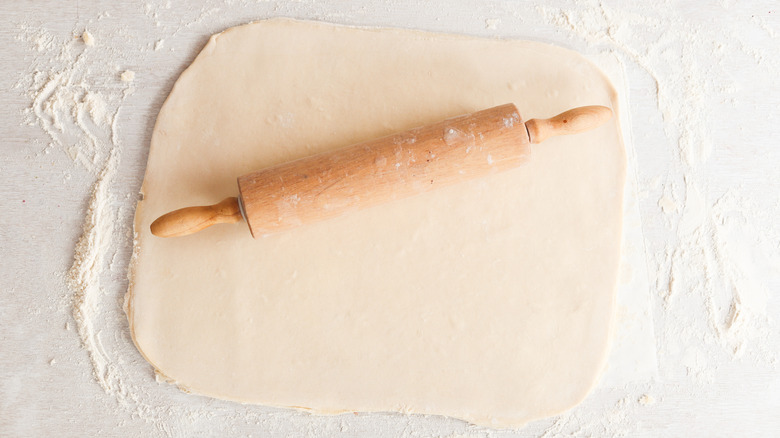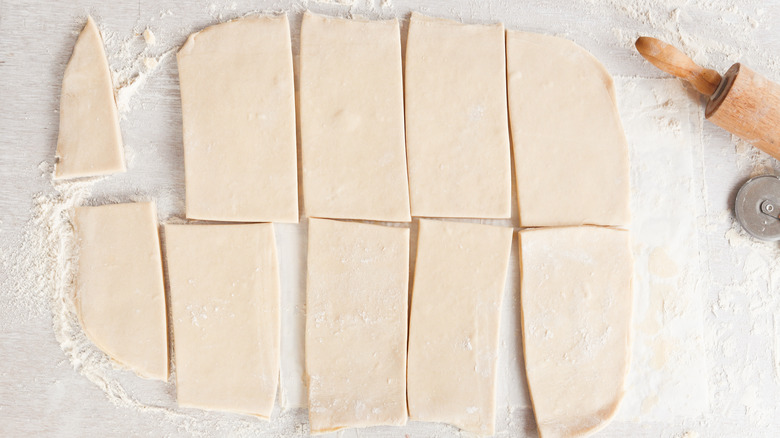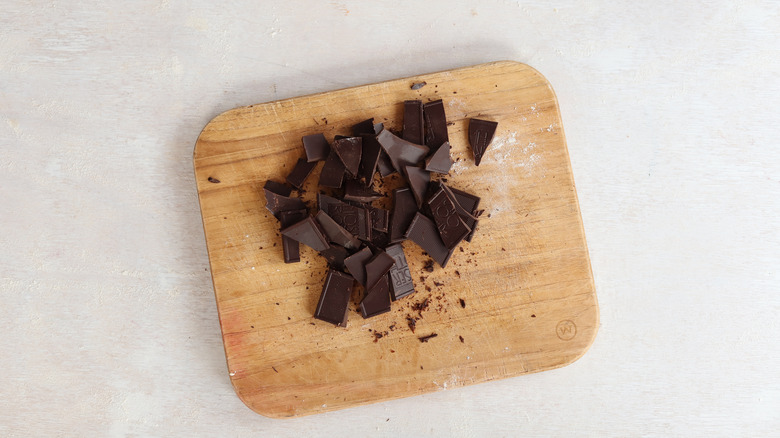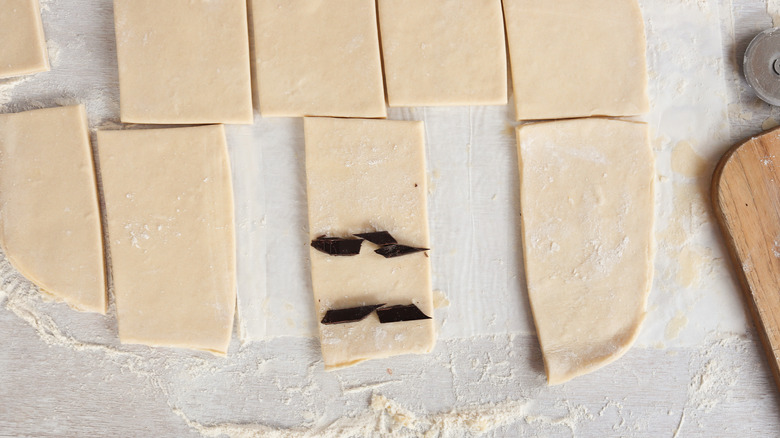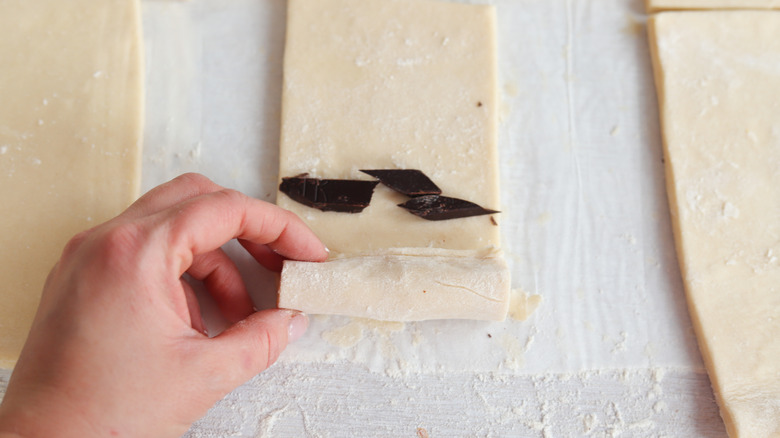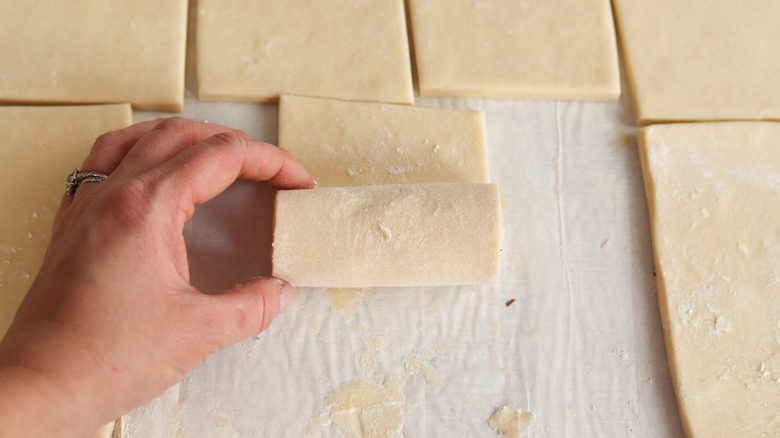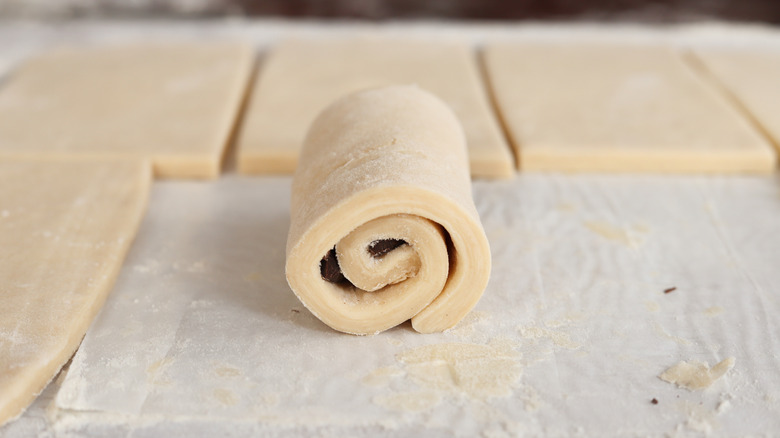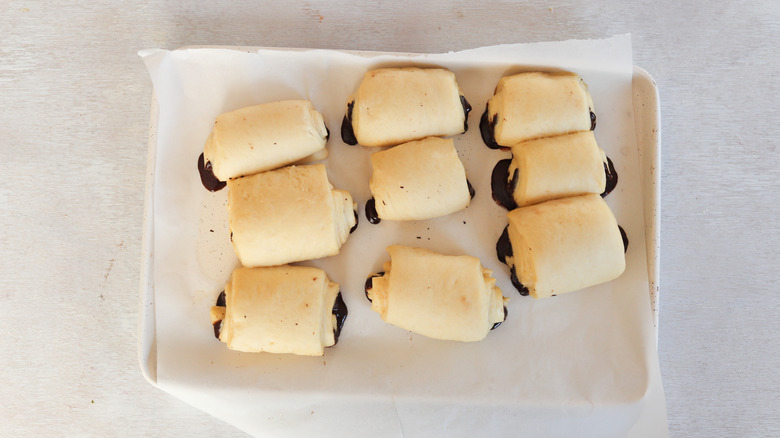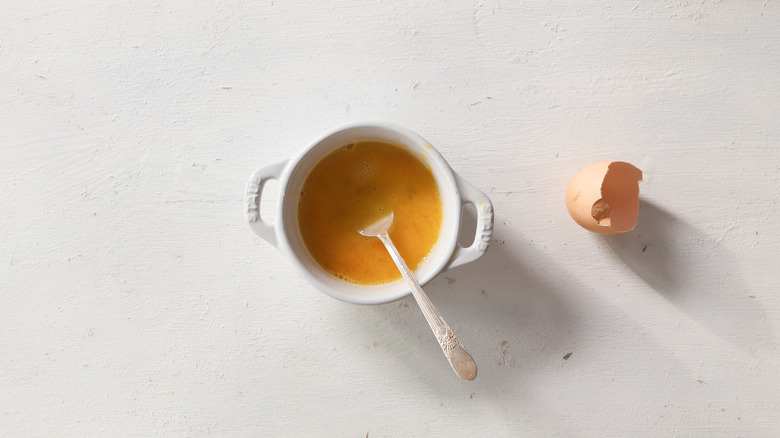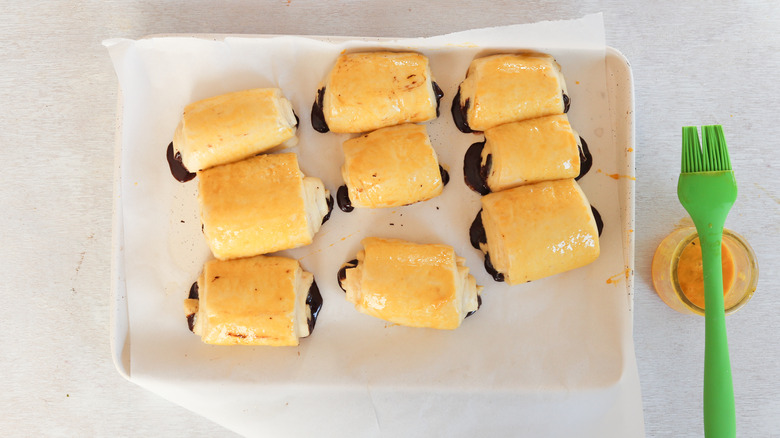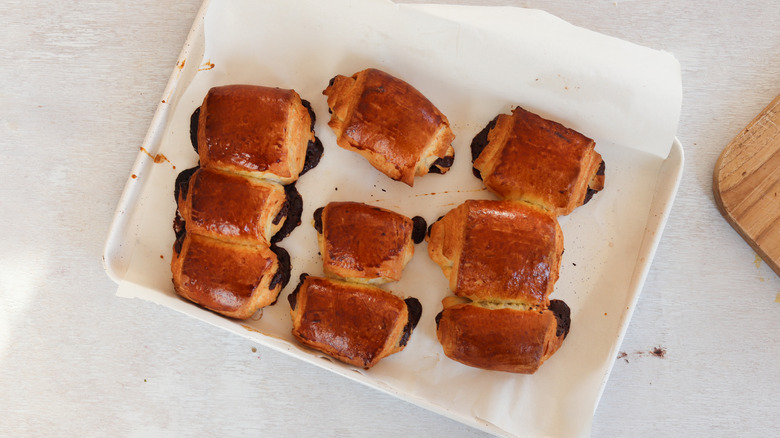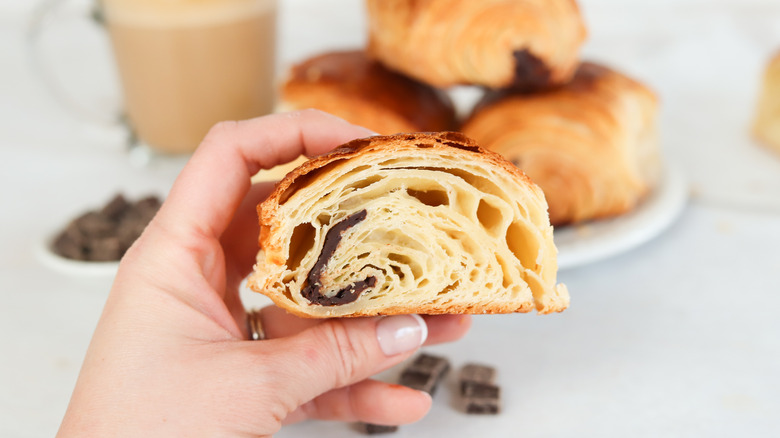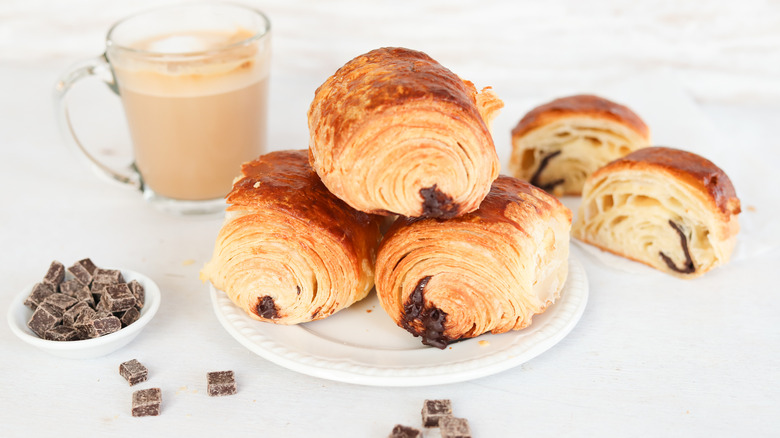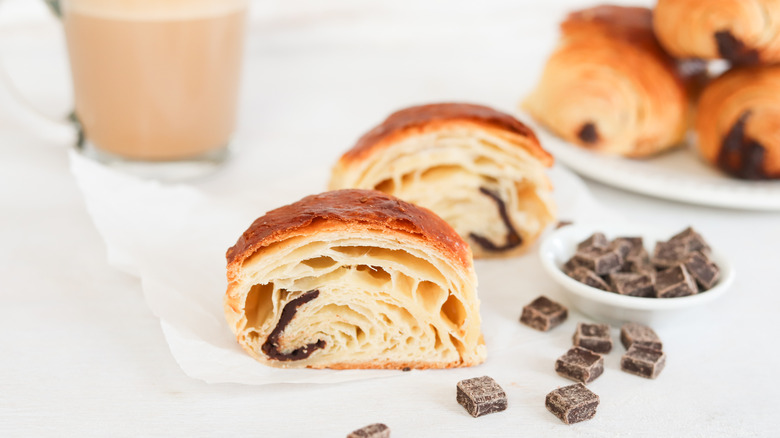Easy (Well, Easier) Pain Au Chocolat Recipe
There are endless recipes for pain au chocolat: those complicated, chocolate-filled, flaky rolls of croissant dough. Most recipes are extremely lengthy, highly specific, and very temperamental. Recipe developer Leah Maroney has combined a few shortcut techniques to make the process easier without sacrificing any of the flavor or texture.
The key to making pain au chocolat lies in a few principles: Keep it cold, keep it thin, and let it rise. Maroney cautions, "There are a lot of steps to making pain au chocolat. Even this easier version takes time, but it's 100% worth the effort." Once you bite into the flaky, dark chocolate-filled pastry, you won't regret the work. In this version of the recipe, there's no slab of butter to roll out between pastry sheets, instead the butter is grated in between each layer of dough. It requires a few steps but much less effort than the traditional method.
This dough can be used for any number of pastries, including regular croissants, apple strudel, and cherry danishes. Once you've mastered this technique you'll be able to make all of the flaky pastries of your dreams.
Gather your ingredients for pain au chocolat
Pain au chocolate starts with butter. And you need really good butter, specifically European butter. The milk fat content of this butter allows it to stay colder longer, so don't substitute this ingredient! Freeze the butter ahead of time so it is very, very cold and firm. Cut a portion of the butter into cubes and then add it to the flour. Use a pastry cutter to cut the butter into the flour. Then you'll add sugar, vanilla extract, yeast, and salt. You'll need some milk to turn the mixture into a smooth elastic dough.
After it's rested, been kneaded, and risen, you'll roll the dough into a rectangle and wrap and refrigerate until it is nice and cold. Then cut the dough into pieces and roll each piece into a very thin rectangle. Grate the remaining butter between each sheet of dough, gently pressing each layer together to remove air bubbles, while not touching it too much. After more chilling and rolling, you'll need good dark chocolate, which you'll place on the dough before you roll it into little bundles. Let the dough rise again, and you'll need an egg to make the egg wash. After baking, resist the urge to eat immediately. But don't wait too long either: They're so good when they're fresh.
Step 1: Chop the butter
Chop 1 ¼ cups butter into rough chunks
Step 2: Cut the butter into the flour
Cut the butter into the flour using a pastry cutter until large crumbs form.
Step 3:Add the remaining dry ingredients
Add the sugar, vanilla extract, yeast, and salt and continue cutting into the flour until small crumbs form.
Step 4: Add the milk and form the dough
Using the dough hook attachment on a stand mixer, slowly add the milk to the dry ingredients while the machine is running to form a dough.
Step 5: Mix the dough
Mix on low speed for 3-5 minutes.
Step 6: Let it rest
Then let the dough rest for 10 minutes.
Step 7: Knead again
Knead on low speed again for 8 minutes.
Step 8: Cover and let the dough rise
Cover the dough and let rise for 20 minutes.
Step 9: Deflate the dough
Deflate the dough with your hands.
Step 10: Flatten the dough into a rectangle
Form and flatten the dough into a rough rectangle, about 8 x 9 inches wide and 3 inches thick. Wrap in plastic wrap and refrigerate for 2-4 hours.
Step 11: Cut the dough into pieces
Cut the dough into 20 equal pieces.
Step 12: Roll out each piece
Roll each piece into a thin rectangle, trying to make them all close in size, about 4 x 5 inches. Make them as thin as possible.
Step 13: Stack the dough sheets
Stack the dough sheets on top of each other. You may dust each layer with flour, but it is not necessary.
Step 14: Grate frozen butter over each sheet
Take one sheet of dough, lay it flat, and use a microplane to grate some of the remaining ¾ cup of frozen butter over the surface of the sheet until it is covered.
Step 15: Stack the sheets and flatten
Add another dough sheet on top and gently flatten.
Step 16: Repeat with all the dough sheets
Repeat with all of the remaining dough sheets until you have a large stack.
Step 17: Wrap and refrigerate the dough
Wrap the stack in plastic wrap and refrigerate for 4 hours.
Step 18: Preheat the oven
Preheat the oven to 400 F.
Step 19: Roll out the dough
Roll out the stack with a rolling pin using firm and even pressure.
Step 20: Continue rolling until thin
Continue rolling until you have a large, thin sheet, about 24 inches by 18 inches.
Step 21: Cut the dough into wide strips
Cut the dough in half lengthwise and then crosswise to form 10 strips.
Step 22: Chop the chocolate
Cut the chocolate into rods or shavings.
Step 23: Place chocolate on the dough
Place a piece or two of chocolate along the edge of the croissant dough and another 2 inches from the end.
Step 24: Roll up the dough
Roll the croissant dough over the chocolate.
Step 25: Continue rolling up the dough
Continue to roll the dough over the next strip of chocolate.
Step 26: Place dough on a baking sheet
Finish rolling up the entire strip and place it seam-side down on a parchment-lined baking sheet.
Step 27: Let the pastries rise
Repeat with the remaining strips of dough. Allow the croissants to rise in a warm environment for 30 minutes or until fluffy and jiggly.
Step 28: Make the egg wash
Whisk the egg with a few drops of water to form an egg wash.
Step 29: Brush the pastries with egg wash
Brush the top of each croissant with egg wash.
Step 30: Bake the croissants
Bake the croissants in the preheated oven for 25 minutes. The outside will turn dark before the inside has fully cooked, so wait the full 25 minutes.
Step 31: Cool and serve
Allow to cool to room temperature and serve with your favorite cup of coffee.
Why do I have to grate the butter between each layer?
The more you touch the dough, the more you warm it and risk the butter melting. The butter has to be solid and cold when the pastry goes into the oven because it's the melting process that creates the lamination — all those flaky layers. As the butter melts it releases moisture as steam, and this puffs the pastry and creates airy pockets in it. If the butter melts before the pastry goes into the oven, the flaky layers will not be created since the dough will just melt into itself.
The process of grating the frozen butter between the layers helps to keep the entire dough stack cold so you don't have to refrigerate it for as long. Most bakeries make their croissant and puff pastry dough by creating a large slab of cold butter that is rolled between the sheets of dough. This is a difficult and somewhat strenuous process, and since most of us don't have a large professional dough sheet roller, our butter grating method is much easier for the home cook. Dough made with frozen grated butter results in the same amount of lamination and is much easier to roll out. This method also helps you ensure you have even layers of butter and dough. The inside of your baked croissant will look like a gorgeous web of flaky pockets.
How do I store pain au chocolat?
Pain au chocolat is best served on the day it is baked. However, if you're not able to eat all 10 in one day (even though you may want to!) you can store them a few different ways. They are fine on the counter in an airtight container for 2-3 days. You can reheat them in the microwave for 10 seconds or pop them in the oven at 350 F for a few minutes to freshen them up.
You can also freeze them right away in a plastic storage bag — they will keep in the freezer for up to 6 months and you can warm them in the microwave or oven. You can also freeze the croissants before the dough has risen (this is a great option if you don't want to risk the chance that any of the 10 croissants will go stale). After you roll the croissant dough over the chocolate, place the pastries on a parchment-lined baking sheet and freeze until solid. Store them in an airtight container or plastic storage bag in the freezer for up to 6 months. When you're ready to bake them, take them out of the freezer, place them on a lined baking sheet, and allow them to rise overnight at room temperature. Then bake as directed above.
Easy (Well, Easier) Pain Au Chocolat Recipe
With tender flaky layers of pastry wrapped around dark chocolate, these pain au chocolate are as tasty as the traditional version, but require much less work.

Ingredients
- 2 cups frozen unsalted butter, divided
- 4 cups flour
- ¼ cup granulated sugar
- 1 teaspoon vanilla extract
- 2 teaspoons yeast
- 1 ½ teaspoons salt
- 1 ½ cups milk
- 4 ounces dark chocolate
- 1 egg
Directions
- Chop 1 ¼ cups butter into rough chunks
- Cut the butter into the flour using a pastry cutter until large crumbs form.
- Add the sugar, vanilla extract, yeast, and salt and continue cutting into the flour until small crumbs form.
- Using the dough hook attachment on a stand mixer, slowly add the milk to the dry ingredients while the machine is running to form a dough.
- Mix on low speed for 3-5 minutes.
- Then let the dough rest for 10 minutes.
- Knead on low speed again for 8 minutes.
- Cover the dough and let rise for 20 minutes.
- Deflate the dough with your hands.
- Form and flatten the dough into a rough rectangle, about 8 x 9 inches wide and 3 inches thick. Wrap in plastic wrap and refrigerate for 2-4 hours.
- Cut the dough into 20 equal pieces.
- Roll each piece into a thin rectangle, trying to make them all close in size, about 4 x 5 inches. Make them as thin as possible.
- Stack the dough sheets on top of each other. You may dust each layer with flour, but it is not necessary.
- Take one sheet of dough, lay it flat, use a microplane to grate some of the remaining ¾ cup of frozen butter over the surface of the sheet until it is covered.
- Add another dough sheet on top and gently flatten.
- Repeat with all of the remaining dough sheets until you have a large stack.
- Wrap the stack in plastic wrap and refrigerate for 4 hours.
- Preheat the oven to 400 F.
- Roll out the stack with a rolling pin using firm and even pressure.
- Continue rolling until you have a large, thin sheet, about 24 inches by 18 inches.
- Cut the dough in half lengthwise and then crosswise to form 10 strips.
- Cut the chocolate into rods or shavings.
- Place a piece or two of chocolate along the edge of the croissant dough and another 2 inches from the end.
- Roll the croissant dough over the chocolate.
- Continue to roll the dough over the next strip of chocolate.
- Finish rolling up the entire strip and place seam-side down on a parchment-lined baking sheet.
- Repeat with the remaining strips of dough. Allow the croissants to rise in a warm environment for 30 minutes or until fluffy and jiggly.
- Whisk the egg with a few drops of water to form an egg wash.
- Brush the top of each croissant with egg wash.
- Bake the croissants in the preheated oven for 25 minutes. The outside will turn dark before the inside has fully cooked, so wait the full 25 minutes.
- Allow to cool to room temperature and serve with your favorite cup of coffee.
Nutrition
| Calories per Serving | 627 |
| Total Fat | 43.8 g |
| Saturated Fat | 26.6 g |
| Trans Fat | 0.0 g |
| Cholesterol | 117.6 mg |
| Total Carbohydrates | 50.6 g |
| Dietary Fiber | 2.8 g |
| Total Sugars | 9.8 g |
| Sodium | 357.8 mg |
| Protein | 8.4 g |
